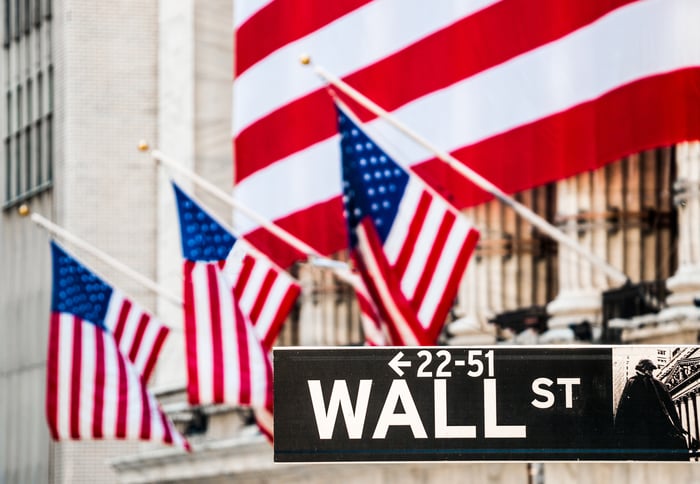The iconic Dow Jones Industrial Average (^DJI 0.25%) is set to hit another big milestone this year. On May 26, the most widely followed global stock index will celebrate its 125th anniversary.
Over the past 124 years, the Dow Jones has undergone numerous changes. It was founded as a 12-company index back in 1896, increased to 20 companies in October 1916, and bumped up to 30 components in October 1928 (the same number of companies in the Dow today). Taking into account all of the companies removed and added over the years, the Dow has seen more than 50 changes in its storied history.
However, one constant over those 124 years is that it's remained a price-weighted index. The higher a company's share price, the more influence it holds over the index. That's in stark contrast to the broad-based S&P 500, which is a market cap-weighted index.
As we move forward into the new year, the following five Dow stocks stand out as its most important.

Image source: Getty Images.
1. UnitedHealth Group
Prior to its split, Apple was the most influential company in the Dow Jones Industrial Average. Following its split, it's now the 21st-most-important company. It's been replaced by health insurance and healthcare services giant UnitedHealth Group (UNH 2.00%). UnitedHealth is responsible for 2,351 of the Dow's 31,069 points.
UnitedHealth has played a big role in the Dow's winning streak since the end of the Great Recession. It's one of a small number of companies that's currently riding a 12-year winning streak. By this I mean UnitedHealth has, inclusive of dividends, delivered a positive return for its shareholders for 12 consecutive years.
Although the company relies on the predictability of cash flow and strong pricing power associated with offering health insurance, UnitedHealth's Optum segment has really been its greatest growth driver. Providing pharmacy care services, healthcare-focused software, and healthcare management services has led to sustainable double-digit sales growth and margins that have consistently come in higher than its health insurance operations.

Image source: Getty Images.
2. Goldman Sachs
Investment bank Goldman Sachs (GS -0.02%) is the sixth-smallest company in the Dow Jones by market cap, but it has the second-greatest influence over the index thanks to its $302 share price. This equates to 1,988 Dow points.
Following the coronavirus swoon of March 2020, Goldman Sachs has been pretty much unstoppable. The company recorded its highest annualized return on equity in a decade (17.5%) during the third quarter. Historically low lending rates continue to fuel merger and acquisition activity, while volatile equity markets have pumped up demand for wealth management services and the company's Fixed Income, Currency, and Commodities segment.
Even after more than doubling from its 2020 low, Goldman Sachs is still reasonably priced. It's a valued at 33% above book value and a sensible 12 times forecasted profits for the current year. With the Federal Reserve expected to keep lending rates at or near historic lows through 2023, lending activity and mergers should keep Goldman busy.

Image source: Home Depot.
3. Home Depot
Home improvement retailer Home Depot (HD 0.77%) is the third-most influential stock in the Dow Jones. Based on its Jan. 12 closing price, Home Depot accounts for 1,818 Dow points.
Home Depot's success comes from its ability to win in both the commercial and consumer markets. Historically low lending rates and record-low mortgage rates have fueled new home construction. That's allowed the company to entrench itself further with contractors. Meanwhile, Home Depot also resonates with consumers looking to remodel or update their existing home. This dual approach has allowed Home Depot to excel in both booming and contracting economies.
Home Depot is also investing aggressively in digitization to further streamline and improve the consumer experience. In addition to promoting online sales, the company has worked hard to improve the efficacy of its supply chain, minimizing overhead expenses without compromising its ability to quickly get consumers what they need. Expect this hefty investment to pay off in the form of improved operating margins by mid-decade.

Image source: Getty Images.
4. Amgen
Though it was only added to the Dow less than five months ago, blue-chip biotech stock Amgen (AMGN 0.82%) is its fourth-most important component. The company's nearly $237 share price translates into 1,557 Dow points.
Though Amgen is considered biotech royalty, and its share price has been motoring higher since 2011, the company's operating results lay out a more tumultuous future than its stock depicts. Amgen is seeing increased competition and exclusivity cliffs for a handful of its blockbuster drugs, such as Neulasta and Enbrel. At the same time, newly launched and acquired products have seen their sales soar, including Otezla and Aimovig.
Amgen is no longer the growth stock it once was. The company's sales growth now hovers in the mid-single digits, with a forward earnings multiple in the 13 to 15 range. Look for Amgen to use its juicy margins and healthy operating cash flow to make bolt-on acquisitions that drive growth in the next couple of years.

Image source: Getty Images.
5. salesforce.com
Finally, there's cloud-based customer relationship management (CRM) kingpin salesforce.com (CRM 0.61%). Salesforce, which was also added to the Dow in late August with Amgen, is responsible for 1,418 Dow points.
CRM software is used by consumer-facing businesses to log customer info, manage service issues, oversee marketing campaigns, and even suggest add-on sales. Salesforce controlled more than 18% of the global market for this cloud-based software at the end of 2019, and no other companies were particularly close to threatening its dominance.
Salesforce also recently announced the largest acquisition in the company's history: a $27.7 billion deal to acquire Slack Technologies. When complete, this transaction will give salesforce a platform to cross-sell its CRM solutions to Slack's rapidly growing enterprise base. In other words, look for continued 20%+ annual sales growth.





